Writing Tips - Blog Posts



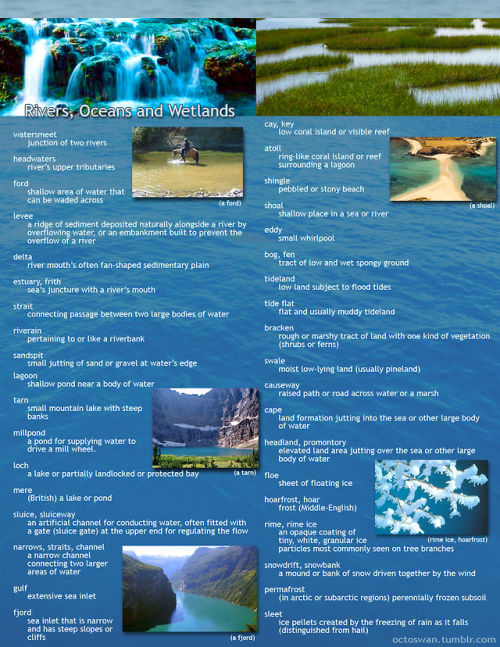

I made these as a way to compile all the geographical vocabulary that I thought was useful and interesting for writers. Some descriptors share categories, and some are simplified, but for the most part everything is in its proper place. Not all the words are as useable as others, and some might take tricky wording to pull off, but I hope these prove useful to all you writers out there!
(save the images to zoom in on the pics)
Hiiii i just wanna say i love your writing and i want to get into writing fics but i dont know where to start do you have any tips?
thank you so much! I have a few tips you can read down below :) or just dm me!! id happy to answer some more questions if you’d like
im quite a creative person so everytime i listen to songs, i make up stories following the lyrics! that's why for my 1k event, i chose song requests — thats where i get my inspo from anyway!
as example, writing "the greatest" was very easy for me because i went from lyric to lyric — so while i did have to make it my own story (pairing, storyline etc.) i already knew what the main point of the story was — feeling unappreciated / ignored in your own relationship, which obviously is meaning of the song.
at some point you will just go along with your own ideas from start to finish, but it's also okay if you don't. for me it's definitely easier to write to songs because i can basically 'hear' the vibe i want my readers to feel while reading my story — for the greatest, that was frustration, sadness, etc.
for the actual act of writing i don't have many tips as i am not a native speaker. all i can say is, write what you read. and i don't mean that as in 'steal other people's work', but rather as the act of finding different wording or phrasing to make your stories more appealing.
you could write ‘they felt nervous’ or you actually describe how said person’s hands were shaky and their breath unsteady — i think you get what i mean.
if you asked me to write a story in german, it would be a lot better than my english writing here on tumblr. but i’ll just keep reading and reading and reading until i can improve my own writing the way i want to :)
so - just write whatever and whenever you feel like. motivation comes and goes, so does inspiration. i have a wip that’s been sitting in my notion app for months now, but i managed to write ‘the greatest’ in maybe 4 days.
my main tip tho is to just write!!! if you have any ideas, type them down immediately. you can keep going immediately or just continue whenever you find the time or the inspo again - but you at least have something written down already.
school’s been fucking my head lately so idk if anything of what i’ve said even makes sense so im sorry if it doesn’t 🫶🏻
hey when you make posts, i just want you to know, thou/thee/thy/thine/ye are like he/you(object)/your/yours/you(subject) okay? "thou art wearing shoes," "i will wear shoes for thee," okay?
you say thine if the next word starts with a vowel and thy if the next word starts with a consonant and they both mean "your" so "thine own shoes," "thy shoes," okay?
and ye means you and refers to the subject of a sentence, "ye members of the brotherhood of shoes," okay? you need this information to create better knight yaoi. i'm personally more interested in nun yuri but we are a community
So, tattoo shop AUs are really popping off lately and personally I love it. What’s more romantic than bleeding for art? Nothing!
But as someone married to a tattoo artist, I have been experiencing some mild She Wouldn’t Say That regarding tattoo culture. So here’s a few quick tips that may help inform your AU. With a grain of salt for my mostly-second-hand knowledge:
NO ONE REPUTABLE SHOP WILL TATTOO A DRUNK PERSON. EVER. or even a person they suspect of any kind of inebriation. This is not just for Regret reasons, but also because alcohol is a blood thinner. If someone is on an acute dose of blood thinners, you generally do not want to stab them dozens of times per second.
Maybe this is regional, but in my experience most tattoo places don’t call themselves parlors anymore. It has a kind of seedy vibe. I see shop or studio a lot but rarely parlor.
Most tattoo artists are hot, yes, but none are as hot at my wife
Tattooing janks up your hands. Sometimes in a RSI way but definitely in a changing-gloves-every-five-minutes-fucks-up-your-skin way.
Artists themselves are rarely if ever employees of the shop. They will be independent contractors who pay the shop either a cut of their sales or rent on their station like a hair dresser. They are also (usually) responsible for taking care of their own supplies, tools, etc. except for the stencil printer. What kind of dweeb would have their own stencil printer?
There is always a line for the stencil printer. Always.
Artists generally spend orders of magnitude more time working on art, replying to emails, doing consults, etc compared to time with their needles in skin.
A typical schedule for an artist might be: wake up at noon and guzzle half her body weight in coffee, one appointment from 1-4, and another from 6-9. Home to eat one (1) real meal at 10 pm. Drawing until 5 am. This is good for her actually and good for our marriage and she’s so healthy all the time.
An ideal shop receptionist needs to be friendly, knowledgeable, and encouraging. They also need to be willing to get out the baseball bat that is kept behind the counter.
If a shop has to choose between “good people skills” and “will promptly rebuff Nazis and the obviously inebriated” the later is often a more important consideration.
At any given moment in any given shop there’s going to be at least one apprentice or someone bumming around hoping to be taken on as an apprentice. They spawn on tic and this feature cannot be disabled.
Again I can not overstate how hot my wife is






I saw this step-by step tutorial of how to Gird Your Loins and it needed to be readjusted.
Apparently a lot of people get dialogue punctuation wrong despite having an otherwise solid grasp of grammar, possibly because they’re used to writing essays rather than prose. I don’t wanna be the asshole who complains about writing errors and then doesn’t offer to help, so here are the basics summarized as simply as I could manage on my phone (“dialogue tag” just refers to phrases like “he said,” “she whispered,” “they asked”):
“For most dialogue, use a comma after the sentence and don’t capitalize the next word after the quotation mark,” she said.
“But what if you’re using a question mark rather than a period?” they asked.
“When using a dialogue tag, you never capitalize the word after the quotation mark unless it’s a proper noun!” she snapped.
“When breaking up a single sentence with a dialogue tag,” she said, “use commas.”
“This is a single sentence,” she said. “Now, this is a second stand-alone sentence, so there’s no comma after ‘she said.’”
“There’s no dialogue tag after this sentence, so end it with a period rather than a comma.” She frowned, suddenly concerned that the entire post was as unasked for as it was sanctimonious.
How to show emotions
Part IV
How to show bitterness
tightness around their eyes
pinched mouth
sour expression on their face
crossed arms
snorting angrily
turning their eyes upward
shaking their head
How to show hysteria
fast breathing
chest heaving
trembling of their hands
weak knees, giving in
tears flowing down their face uncontrollably
laughing while crying
not being able to stand still
How to show awe
tension leaving their body
shoulders dropping
standing still
opening mouth
slack jaw
not being able to speak correctly
slowed down breathing
wide eyes open
softening their gaze
staring unabashingly
How to show shame
vacant stare
looking down
turning their head away
cannot look at another person
putting their head into their hands
shaking their head
How to show being flustered
blushing
looking down
nervous smile
sharp intake of breath
quickening of breath
blinking rapidly
breaking eye contact
trying to busy their hands
playing with their hair
fidgeting with their fingers
opening mouth without speaking
Part I + Part II + Part III + Part V
If you like my blog and want to support me, you can buy me a coffee or become a member! And check out my Instagram! 🥰
site that you can type in the definition of a word and get the word
site for when you can only remember part of a word/its definition
site that gives you words that rhyme with a word
site that gives you synonyms and antonyms
What if oxygen is poisonous and it just takes 75-100 years to kill us?
Emotion Wheel
My therapist gave me this to help me dive deeper into my emotions during sessions because I have trouble getting past my “primary” emotions:

I thought maybe it could help other people so. 🤷♀️
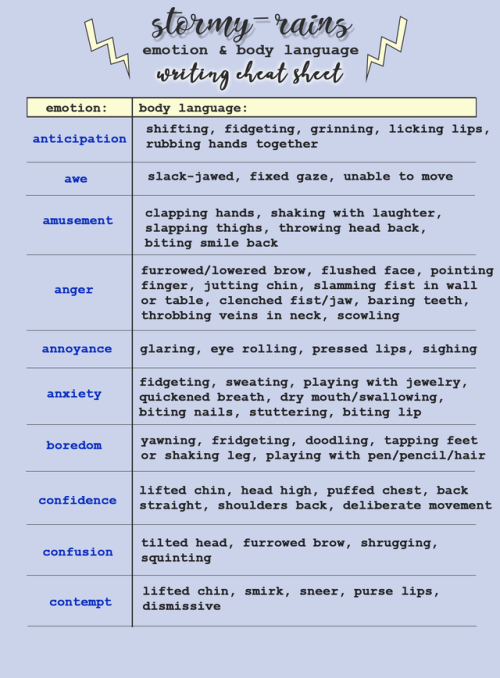
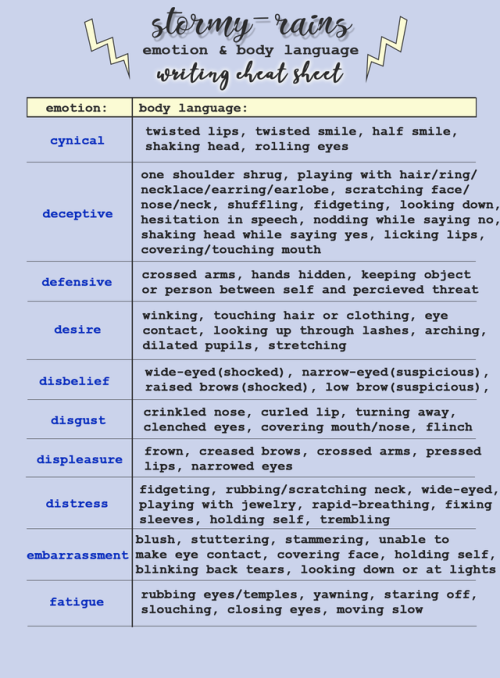

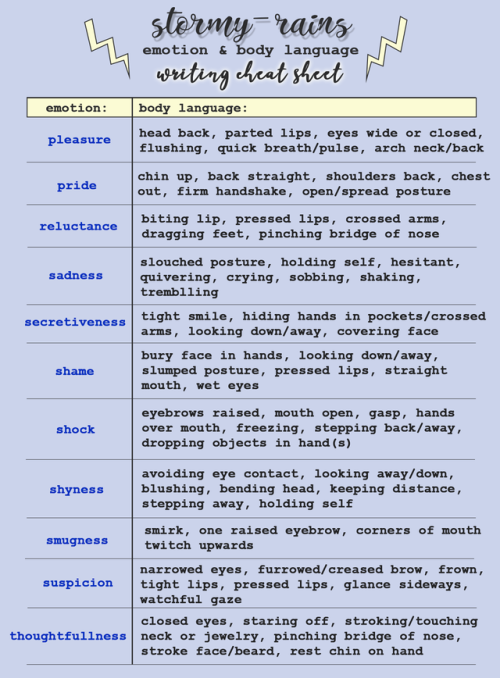
A Writing Cheat Sheet: for linking actions with emotions.
As always, click for HD.
Apparently I badly want to go on my “stop making fun of plague doctors, they were ahead of their time and doing the best they could with the primitive equipment they had available” rant.
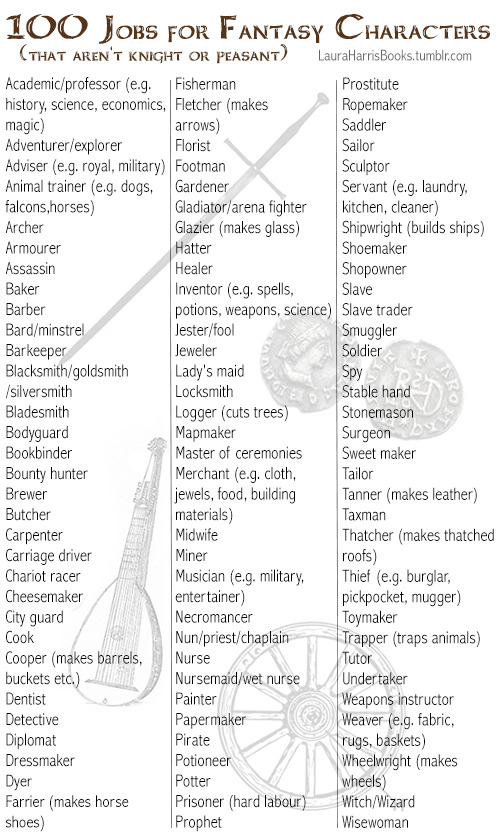
Beyond this, consider how these professions might vary depending on who the customers are - nobles, or lower class. Are they good at their job or just scraping by? Do they work with lots of other people or on their own? City or village?
For younger characters:
Apprentice to any of the above
Messenger/runner
Page/squire
Pickpocket
Shop assistant
Student
Looks after younger siblings
(Images all from Wikimedia Commons)
“This is your daily, friendly reminder to use commas instead of periods during the dialogue of your story,” she said with a smile.
it’s hilarious to me when people call historical fashions that men hated oppressive
like in BuzzFeed’s Women Wear Hoop Skirts For A Day While Being Exaggeratedly Bad At Doing Everything In Them video, one woman comments that she’s being “oppressed by the patriarchy.” if you’ve read anything Victorian man ever said about hoop skirts, you know that’s pretty much the exact opposite of the truth
thing is, hoop skirts evolved as liberating garment for women. before them, to achieve roughly conical skirt fullness, they had to wear many layers of petticoats (some stiffened with horsehair braid or other kinds of cord). the cage crinoline made their outfits instantly lighter and easier to move in
it also enabled skirts to get waaaaay bigger. and, as you see in the late 1860s, 1870s, and mid-late 1880s, to take on even less natural shapes. we jokingly call bustles fake butts, but trust me- nobody saw them that way. it was just skirts doing weird, exciting Skirt Things that women had tons of fun with
men, obviously, loathed the whole affair

(1864)

(1850s. gods, if only crinolines were huge enough to keep men from getting too close)

(no date given, but also, this is 100% impossible)

(also undated, but the ruffles make me think 1850s)
it was also something that women of all social classes- maids and society ladies, enslaved women and free women of color -all wore at one point or another. interesting bit of unexpected equalization there
and when bustles came in, guess what? men hated those, too

(1880s)

(probably also 1880s? the ladies are being compared to beetles and snails. in case that was unclear)

(1870s, I think? the bustle itself looks early 1870s but the tight fit of the actual gown looks later)
hoops and bustles weren’t tools of the patriarchy. they were items 1 and 2 on the 19th century’s “Fashion Trends Women Love That Men Hate” lists, with bonus built-in personal space enforcement
YOU KNOW WHAT BOTHERS ME
when fantasy books describe the cloth of Quant Farmpeople’s clothing as “homespun” or “rough homespun”
“homespun” as opposed to what??? EVERYTHING WAS SPUN AT HOME
they didn’t have fucking spinning factories, your pseudo-medieval farmwife is lucky if she has a fucking spinning wheel, otherwise she’s spinning every single thread her family wears on a drop spindle NO ONE ELSE WAS DOING THE SPINNING unless you go out of your way to establish a certain baseline of industrialization in your fake medieval fantasy land.
and “rough”??? lol just because it’s farm clothes? bitch cloth was valuable as fuck because of the labor involved ain’t no self-respecting woman gonna waste fiber and ALL THAT FUCKING TIME spinning shitty yarn to weave into shitty cloth she’s gonna make GOOD QUALITY SHIT for her family, and considering that women were doing fiber prep/spinning/weaving for like 80% of their waking time up until very recently in world history, literally every woman has the skills necessary to produce some TERRIFYINGLY GOOD QUALITY THREADS
come to think of it i’ve never read a fantasy novel that talks about textile production at all??? like it’s even worse than the “where are all the farms” problem like where are people getting the cloth if no one’s doing the spinning and weaving??? kmart???
Worldbuilders naming towns: I named this town Elygwe’meth which means “Where the Dearly Beloved King died next to his Lover” in the language I invented and also a combination of the Old English word for diamonds and the Maori word for apples since that’s their main exports
People in real life naming towns: I named this town Big Falls cause big fall there
Speaking of pairings, here’s a brief exercise I’ve used in my tabletop games to quickly generate pairs of NPCs who fit a very specific archetype, but still have some variety to them:
One is tall, the other is short.
One is stout, the other is slender.
One is neat and proper, the other needs some work.
One talks too much, the other lets their actions speak for them.
One is a little bit goofy, the other is kind of intense.
Pick one trait from each row. Character A has those five traits. Character B has the five traits you didn’t pick.
Foods Humanity Figures Out Everywhere
soup: Boil The Food To Make Food Water
stew? gravy? curry?: like soup but less water more food
porridge: add water to the starch but not so much. warm and mushy yum
pancake/flatbread: make the starch wet and flat, then put on hot surface.
fried starch thing: Use hot oil to make starch crispy yum++
dumpling: put the not starch in the starch thing and cook it.
alt dumpling: ball of starch added to soup or stew. makes chewy starch ball yum yum
filled portable food: starch wrapper of some kind to make it so you can eat the messy food with your hands.
Your OPSEC is Bad and You Should Feel Bad
Okay so one of the many things that drives me absolutely nuts about most TV shows and (some) books that involve secret or classified information or secure facilities is how absolutely not secure everything is, so these are a few basic things that people get wrong:
You can't carry around classified information. There are, I assume, exceptions in specific cases, though they are assuredly very carefully managed, but random intel agent #12 cannot legally just take home classified information so they can work on it at home. That's incredibly illegal. And that's for a reason--secure facilities are, as the name suggests, secure. Everywhere else is varying levels of not secure. Even for people working with regular business or government materials on their work phone or laptop, there are varying levels of strict rules about where you can leave it, how to report a lost device, and not keeping it in checked bags.
Badges should be innocuous and limited in visible information. Any sensible security system doesn't have badges that are numbered/colored/otherwise identified by access level, because that is a really easy way to identify targets for thieves/people who want to break in. American federal ID cards (CAC for military, PIV for civilian) have really specific layouts. Some companies distinguish between full time employees, interns, vendors, etc in their cards.
Badges shouldn't be displayed outside of the office. This is not really followed by real people (if you get on the metro on DC you will see a wide variety of visible badges), but displaying a badge is not security-wise because 1) it makes them easier to steal, and 2) it can make you a target.
Names/access level/information shouldn't be openly announced. I'm looking at you, MCU Spider-Man fanfiction. Just. Don't.
Confidential/classified information shouldn't be openly discussed. Stop having your characters talk about confidential or classified information in front of people who shouldn't know it, or even just out in the open at all. They shouldn't be telling their parents, their friends, their spouses, etc. Even businesses or government buildings that deal with sensitive information, there may be spaces where certain things can or can't be discussed, and employees/contractors will go through approximately 8 million trainings on where you can't discuss certain information. This also involves erasing whiteboards, locking computers, etc.
You can't have cell phones in certain secure facilities. People shouldn't be having their cell phones with them in SCIFs. This prohibition extends to all things that can be recording devices, including furbies.



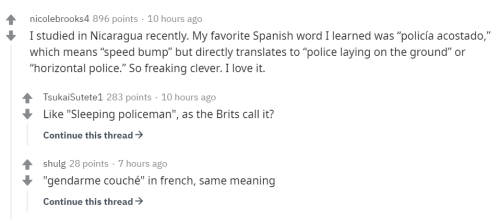
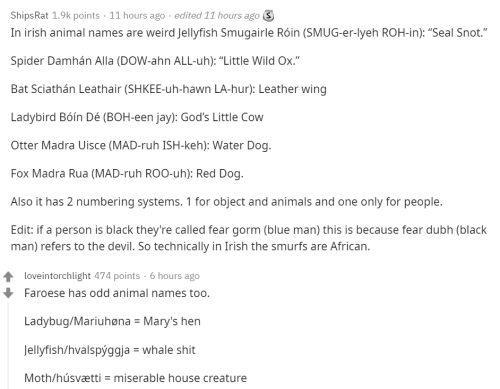





Not bad for a bunch of random noises we make with our mouths. Well done, everyone.
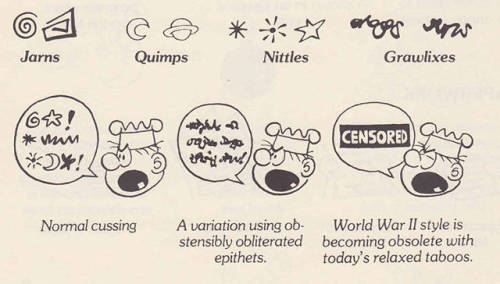
So it occurred to me that ‘grawlix’ is sort of an obscure and specialized word, but what I didn’t know until I was googling around just now is that it was actually invented by cartoonist Mort Walker in his 1980 book The Lexicon of Comicana, in which he categorizes (and invents terminology for) all kinds of visual cues and shorthand commonly used in comics


In other news, this is now right up there with The Meaning of Liff as ‘books of made up words I desperately need to own”
People, especially games, get eldritch madness wrong a lot and it’s really such a shame.
An ant doesn’t start babbling when they see a circuit board. They find it strange, to them it is a landscape of strange angles and humming monoliths. They may be scared, but that is not madness.
Madness comes when the ant, for a moment, can see as a human does.
It understands those markings are words, symbols with meaning, like a pheromone but infinitely more complex. It can travel unimaginable distances, to lands unlike anything it has seen before. It knows of mirth, embarrassment, love, concepts unimaginable before this moment, and then…
It’s an ant again.
Echoes of things it cannot comprehend swirl around its mind. It cannot make use of this knowledge, but it still remembers. How is it supposed to return to its life? The more the ant saw the harder it is for it to forget. It needs to see it again, understand again. It will do anything to show others, to show itself, nothing else in this tiny world matters.
This is madness.
Pro Tip: The Way You End a Sentence Matters
Here is a quick and dirty writing tip that will strengthen your writing.
In English, the word at the end of a sentence carries more weight or emphasis than the rest of the sentence. You can use that to your advantage in modifying tone.
Consider:
In the end, what you said didn't matter.
It didn't matter what you said in the end.
In the end, it didn't matter what you said.
Do you pick up the subtle differences in meaning between these three sentences?
The first one feels a little angry, doesn't it? And the third one feels a little softer? There's a gulf of meaning between "what you said didn't matter" (it's not important!) and "it didn't matter what you said" (the end result would've never changed).
Let's try it again:
When her mother died, she couldn't even cry.
She couldn't even cry when her mother died.
That first example seems to kind of side with her, right? Whereas the second example seems to hold a little bit of judgment or accusation? The first phrase kind of seems to suggest that she was so sad she couldn't cry, whereas the second kind of seems to suggest that she's not sad and that's the problem.
The effect is super subtle and very hard to put into words, but you'll feel it when you're reading something. Changing up the order of your sentences to shift the focus can have a huge effect on tone even when the exact same words are used.
In linguistics, this is referred to as "end focus," and it's a nightmare for ESL students because it's so subtle and hard to explain. But a lot goes into it, and it's a tool worth keeping in your pocket if you're a creative writer or someone otherwise trying to create a specific effect with your words :)
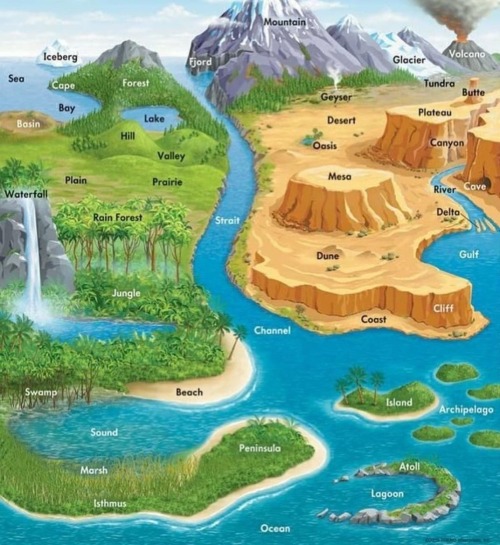
just had a flashback to me in 3rd grade absolutely blissed out just staring at this pic

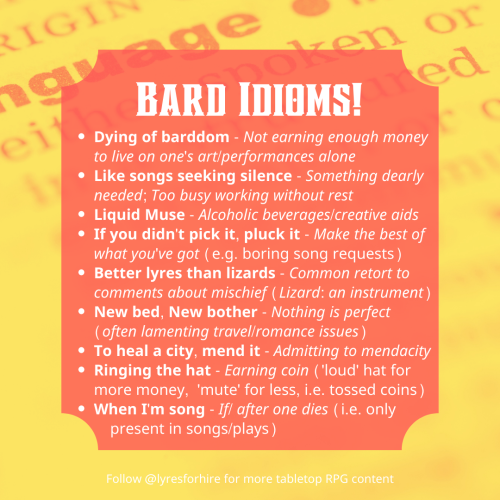
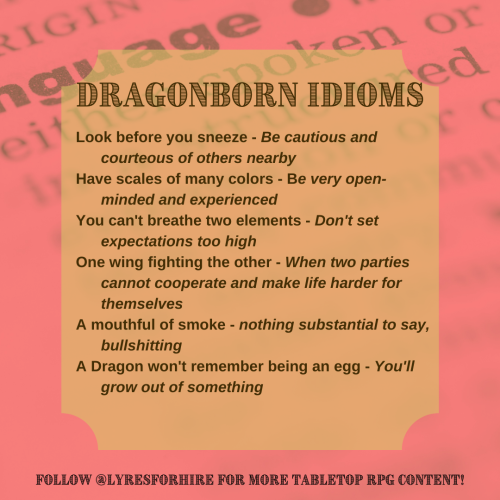
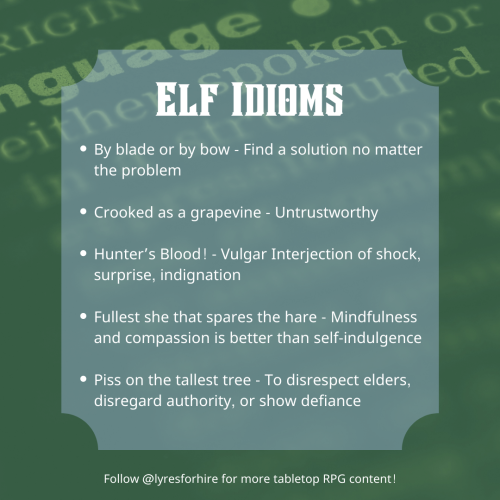
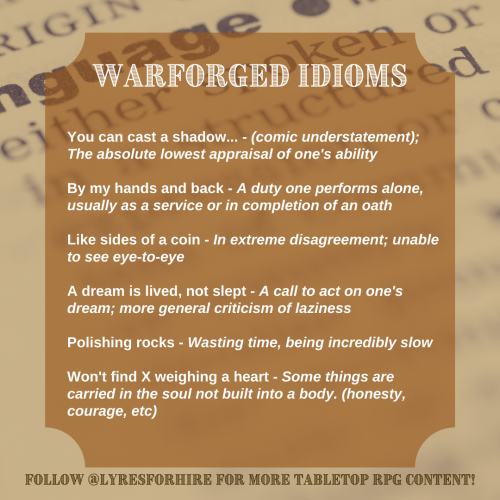
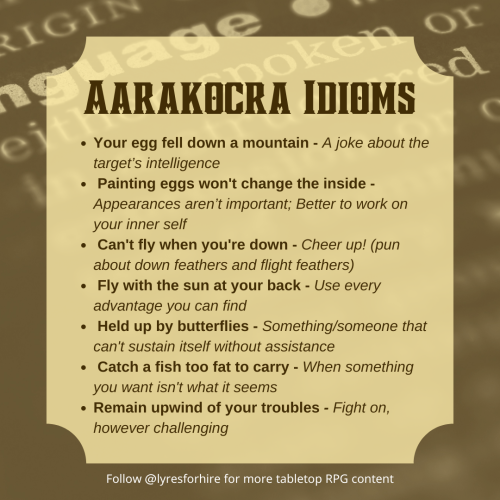
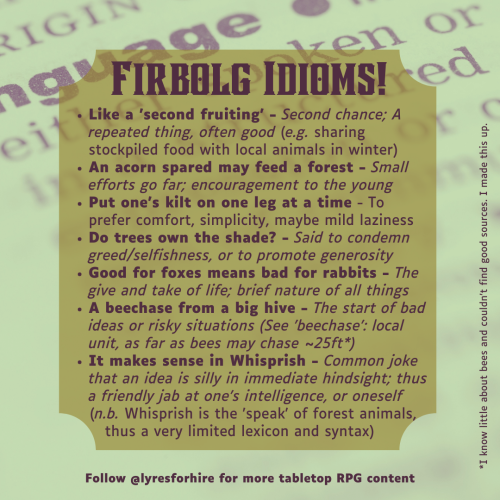
Some idioms for fantasy races and classes shared by u/nagonjin on reddit. Follow her on instagram (@lyresforhire) for more D&D idioms.
My favorite one is the bard one “When I am song”

